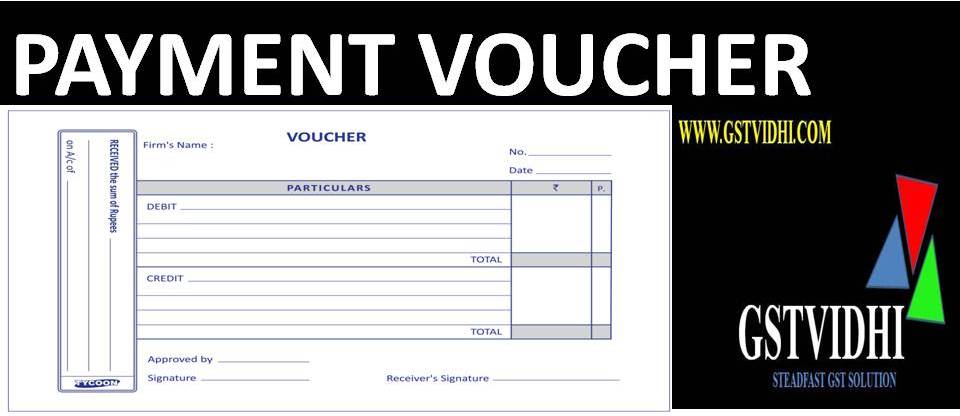
Payment Voucher Under GST and Consequences of Non-Compliance
What is a
Payment Voucher in GST?
Under the Goods and
Services Tax (GST) law, proper documentation is essential — especially when
you're paying tax under Reverse Charge Mechanism (RCM). One such
important document is the Payment Voucher.
Legal
Provision: Section 31(3)(g) of CGST Act, 2017
It states that:
“A registered person who
is liable to pay tax under Section 9(3) or Section 9(4) (i.e.,
under reverse charge) shall issue a payment voucher at the time of
making payment to the supplier.”
This rule ensures that
even when tax is paid by the recipient (and not the supplier), the
transaction is properly recorded.
When is a
Payment Voucher Required?
You need to issue a
payment voucher when:
- You’re a registered person under
GST, and
- You are making a payment to a supplier
who is supplying goods or services that are taxable under reverse
charge.
Even if the supplier is
unregistered, a payment voucher is still mandatory.
Special
Case: Import of Services from Associated Enterprises
In case you’re importing services
from an associated enterprise, the time of supply is determined based
on the date of payment or date of entry in the books, whichever is
earlier.
So, issuing a payment voucher becomes vital to establish the timeline
and comply with GST law.
Contents of
a Payment Voucher (As per Rule 52 of CGST Rules)
A valid payment voucher
must include the following:
1. Supplier’s
Name, Address, and GSTIN (if registered)
2. A
Unique Serial Number (max 16 characters, can include
alphabets, numbers, "/", or "-")
3. Date
of Issue
4. Recipient’s
Name, Address, and GSTIN
5. Description
of Goods or Services
6. Amount
Paid
7. Rate
of GST (CGST, SGST/UTGST, IGST, Cess)
8. Amount
of GST Payable
9. Place
of Supply and State Code (for inter-State supply)
10. Signature
or Digital Signature of the supplier or their authorized
representative
Why is a
Payment Voucher Important?
- Acts as evidence of payment
made to the supplier
- Helps determine the time of supply
under reverse charge
- Supports claim for Input Tax
Credit (ITC) (if applicable)
- Ensures compliance with record-keeping
requirements under GST
Without issuing a payment
voucher, your books may be considered incomplete or inaccurate during
audit or inspection.
Consequences
of Not Issuing a Payment Voucher
As per Rule 56 of
the CGST Rules, every registered person must maintain proper records,
including:
- Invoices
- Bills of supply
- Delivery challans
- Payment vouchers
- Credit/debit notes
- Receipt vouchers, etc.
Penalty for
Non-Compliance: Section 122(1)(xvi)
If a taxable person fails
to keep or maintain books of accounts or documents as required under GST
law:
- Penalty under CGST Act:
₹10,000
- Penalty under SGST Act:
₹10,000
Total
penalty = ₹20,000
This penalty applies even
if the tax was paid correctly but supporting documents like payment vouchers
were not maintained.
Illustrative
Example
Scenario:
ABC Ltd. (registered under GST) receives legal consultancy services from Mr. X
(an unregistered advocate). Legal services are taxable under RCM.
ABC Ltd. must:
1. Pay
GST under reverse charge.
2. Issue
a self-invoice (since Mr. X is unregistered).
3. Issue
a payment voucher at the time of making payment to Mr. X.
Failing to issue the
payment voucher will be treated as non-compliance, and may attract
penalties.
Conclusion
The requirement to issue
a Payment Voucher under GST is not just a formality — it's a statutory
obligation that plays a key role in:
- Complying with Reverse Charge
Mechanism,
- Ensuring transparency in
transactions,
- Determining time of supply,
- Avoiding legal penalties.
Disclaimer: All the Information is based on the notification, circular and order issued by the Govt. authority and judgement delivered by the court or the authority information is strictly for educational purposes and on the basis of our best understanding of laws & not binding on anyone.
Find the Attachment (Press on Click Here )
Click here